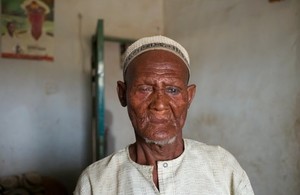New UK aid support to protect 200 million people from debilitating diseases
Support will target five Neglected Tropical Diseases in 25 of the world’s poorest countries which cause disability and death.

- A new UK aid programme will fight diseases in 25 of the world’s poorest countries
- Support will target five Neglected Tropical Diseases (NTDs) which cause disability and death
- Baroness Sugg announced the programme at a speech at the Neglected Tropical Disease NGO Network Conference in Liverpool
A new UK aid package will help protect 200 million people worldwide from debilitating diseases, Parliamentary Under Secretary of State Baroness Sugg has announced today.
Speaking at the Neglected Tropical Disease NGO Network Conference in Liverpool, Baroness Sugg announced that the £220 million will tackle five of the world’s worst Neglected Tropical Diseases (NTDs), which can cause disability, death and disfigurement and trap victims in a cycle of poverty. These are lymphatic filariasis (also known as elephantiasis); onchocerciasis; schistosomiasis; visceral leishmaniasis and trachoma.
These diseases affect over a billion people worldwide, stopping adults from working and children from going to school, and are estimated to cost developing economies billions of pounds every year in lost productivity.
Today’s Department for International Development (DFID) package will deliver 600 million treatments to prevent NTDs as a vital step towards their elimination. It will aim to eliminate visceral leishmaniasis from Asia by 2022. The programme will also help national governments to tackle these diseases themselves in future.
International Development Minister Baroness Sugg said:
These debilitating – but preventable – diseases stop sufferers from working, studying and leading prosperous, healthy lives.
This new UK aid support will stop hundreds of millions of people suffering unnecessarily from treatable conditions. It shows how the UK is helping to lead the way in tackling deadly global diseases more generally, including polio and malaria.
Last year, UK aid provided treatment or care to over 140 million people suffering from Neglected Tropical Diseases.
Sightsavers’ Director of Neglected Tropical Diseases Simon Bush said:
More than a billion people are at risk of neglected tropical diseases - a group of conditions which are completely preventable and easy to treat, yet cause agony, disability and often trap people in a cycle of poverty.
Thanks to DFID’s new flagship programme announced today we will be able to treat, control and even eliminate more of them than we have ever before. It is an unprecedented programme working on a scale and scope I have never seen, tackling five diseases in 25 countries and making a long-lasting impact on global health.
Crown Agents’ Chief Executive Officer, Fergus Drake said:
We are delighted to have the opportunity to take forward the UK Department for International Development’s flagship health programme to accelerate the control and elimination of neglected tropical diseases across southern and eastern Africa, and south Asia.
The programme is committed to leaving no one behind and will help to transform the lives of millions of individuals suffering from these debilitating diseases - enabling them to participate in economic and domestic activities once more.
In the long term the programme will contribute to improving health systems and building greater capacity in governments for sustainable response to these diseases.
Notes to editors
-
Neglected Tropical Diseases (NTDs) are a significant cause of poverty, causing suffers to lose their livelihoods and face stigma.
-
In 2017, the UK announced new funding of £360 million over five years to control and eliminate NTDs. The £220 million funding announced today is an allocation from DFID’s flagship NTD programme, which comes from this £360 million support.
-
Sightsavers and Crown Agents will implement the programme working with partners including the Liverpool School of Tropical Medicine.
-
The programme will also provide £6.5 million of funding to the World Health Organisation to tackle NTDs.
Case Study – the stigma of NTDs
Muhammed Abubakar, a tailor from the Kebbi region of Nigeria, has lived with lymphedema for over 10 years. The parasitic disease, spread by mosquito bite, caused his legs and feet to swell to more than double their normal size. It became so painful he found it difficult to push the foot peddle on his sewing machine.
Muhammed faced much stigma and he lost customers, who feared they could catch his condition if he handled their clothes.
The tailor visited hospitals and traditional doctors but received no diagnosis or help until 2017 when he was treated under a UK Aid Match funded programme tackling lymphatic filariasis. He was given a basic care package containing antibacterial and antifungal cream, soap, a washing bowl and a towel, and taught how to treat it himself.
In just four weeks the swelling began to subside. Muhammed’s feet were once around 22 cm in circumference, but have now returned to a more normal size of 13 cm. He is able to spend more time doing his job and his income has gone up. He can also socialise and play football again.
General media queries (24 hours)
Email [email protected]
Telephone 020 7023 0600
If you have an urgent media query, please email the DFID Media Team on [email protected] in the first instance and we will respond as soon as possible.